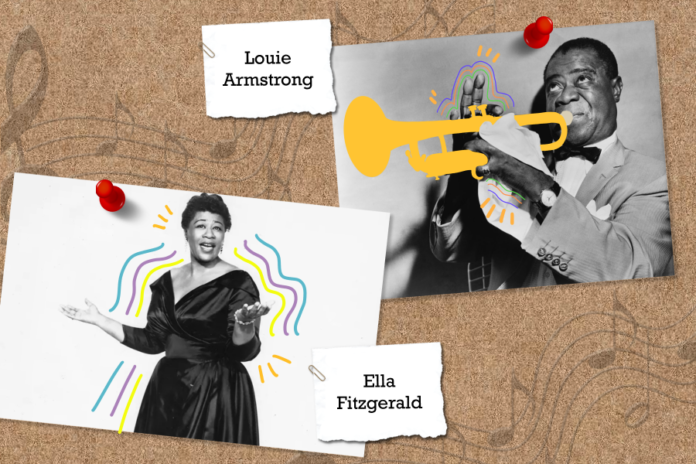The genre revels in rhythm and social relevance
By CLARA FISCHER — arts@theaggie.org
Chances are, you’ve heard of jazz. Whether it’s through an appreciation for the music or a United Airlines commercial, most people have heard at least a couple songs from the wide-ranging genre.
Jazz has a rich and varied background. With roots in the blues and a shifting focus on big band, bebop, crooning and countless sounds in between, this musical style is a true chameleon. On top of its diversity in terms of melodic and rhythmic styles, a key component of jazz is its roots in BIPOC (Black, Indigenous and people of color) culture.
The music style originated in New Orleans as a form of resistance music in the era after Emancipation. Scholars have claimed that “… the music we know as jazz is Black American music, and its very soul is tied to the Black resistance to injustice…” — it’s clear that the influence Black culture has had on the genre cannot be understated.
One of the most well-known vocal jazz musicians is Ella Fitzgerald. Dubbed “The First Lady of Song,” Fitzgerald has one of the most distinctive sounds in vocal history. She rose from humble beginnings after being discovered at an amateur night hosted by a local concert hall, and from there quickly became a master of her craft. Fitzgerald had the opportunity to perform with countless other legendary musicians such as Louis Armstrong (the duo has been lauded as a “perfect partnership”), Billie Holiday, The Ink Spots and Duke Ellington.
More than just a stunning voice, however, Fitzgerald also played a very important role in social issues of the time.
Her endearing nature and velvety vocals allowed her to be well-liked by a largely diverse crowd of people. Armed with the love of the public, she was able to create momentum in the desegregation efforts of the American Civil Rights Movement by playing at many venues and shows that previously did not allow Black performers. Her undeniable success and adoring fans spoke volumes, even at such a hostile time in history.
As to be expected with a music style so deeply rooted in cultural origins, there are many more examples of jazz artists who played an important role in such social reform.
Louis Armstrong famously penned a letter to former president Dwight Eisenhower following the politician’s initial response to the Little Rock Crisis. Billie Holiday’s cover of “Strange Fruit” has been cited as one of the most important connections between popular music and political messaging, with its groundbreakingly jarring lyricism and unapologetic performances by Holiday and other artists.
“That is about the ugliest song I have ever heard… ugly in the sense that it is violent and tears at the gut of what white people have done to my people in this country,” Nina Simone once remarked about “Strange Fruit.” The song has always been incredibly powerful, so it makes sense that it is to this day used as an unmistakable hallmark of protest songs, providing yet another example of the impact jazz music has on the cultural landscape it occupies.
Though jazz is an incredibly diverse genre with clear significance pertaining to various social issues, many worry that the genre has peaked, with trumpeter Nicholas Payton even declaring that it was “… cold, like necrophilia.”
One well-known representation of this pessimistic perception of jazz is displayed in the 2016 Oscar-winning film “La La Land.” In the film, one of the lead characters laments the loss of love for traditional jazz.
However, “La La Land” has been critiqued for its lack of nuance when it comes to the wellbeing of modern jazz, as well as its disregard for the important influence of BIPOC on the genre.
While jazz as a style has definitely evolved, its characteristic spontaneity gives it longevity; Musicians are able to adapt to rhythmic changes on the spot. Why should the music style be any less adaptable?
There are so many remarkable artists, past and present, who represent their craft in a way that words on paper never could. Take a listen, and explore the genre that enthralls fans with its dizzying intricacy and soulful harmonies.
Written by: Clara Fischer — arts@theaggie.org




